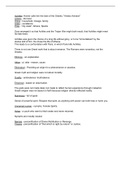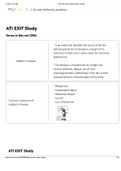Question 1
1.1) 1 -Cognitive Constructivist Theory Jean Piaget
Piaget maintained that a child’s learning is a continuous process of
constructing knowledge. He believed that children acquire information by
interacting with objects, ideas and other people. According to Piaget,
children construct knowledge through two processes of adaptation,
namely, assimilation and accommodation.
Piaget’s stages of cognitive development
• Sensorimotor stage (birth – 2 years). During this stage, babies learn by
exploring their world through their senses (sensory-) – touch, taste, smell,
sight and sound – as they move around (motor). Their knowledge of the
world is limited because it is based on physical interactions.
• Preoperational stage (2–7 years). During this stage, children start to
reason and develop concepts. Piaget maintained that children in this stage
of development have not yet developed logical ways of thinking and
reasoning and cannot master conservation. Only when they have
developed these skills do they to move on to the next stage. During this
, stage, children use symbols to represent other objects, for example, a block
is used as a telephone, and their language, memory and imagination are
developed.
• Concrete operational stage (7–11 years). During this stage, children gain
the ability to think logically and systematically to organize the information
they are learning and to solve problems, but they still need experiences
with concrete objects and hands-on activities. They have not yet developed
the ability to think abstractly and to work things out in their heads. Children
at this stage can classify objects according to size, color and mass.
• Formal operational stage (11–15 years). During this stage, children no
longer need concrete objects and develop the capacity to think in abstract
ways. They develop logical thinking, problem-solving and planning.
2 - The Social Constructivist Theory of Vygotsky
Vygotsky focused on the importance of language in learning. According to
him, children make sense of their world through shared experiences and
learning occurs in the zone of proximal development.
Implications of Vygotsky’s theory for pedagogy
We will now turn to the implications of this theory for teaching and
learning in relation to the role of learners, the role of teachers and the
learning environment.
The role of learners
• Learning is actively constructed, and learners come to learning situations
with already formulated knowledge, ideas and understandings.
• Learners’ previous knowledge forms the basis for the new knowledge
they will create.
• Learning, which is designed as mediation in the ZPD, can lead to cognitive
development. Therefore, teachers must expect more of learners than they
are currently able to do alone.
• A learner creates new understanding for him-/herself. A teacher provides
structured mediation to guide a learner in his/her ZPD.
• Learning is collaborative. Learners learn about learning not only from
themselves but also from their peers. They can pick up strategies and
methods from one another.
The role of teachers
1.1) 1 -Cognitive Constructivist Theory Jean Piaget
Piaget maintained that a child’s learning is a continuous process of
constructing knowledge. He believed that children acquire information by
interacting with objects, ideas and other people. According to Piaget,
children construct knowledge through two processes of adaptation,
namely, assimilation and accommodation.
Piaget’s stages of cognitive development
• Sensorimotor stage (birth – 2 years). During this stage, babies learn by
exploring their world through their senses (sensory-) – touch, taste, smell,
sight and sound – as they move around (motor). Their knowledge of the
world is limited because it is based on physical interactions.
• Preoperational stage (2–7 years). During this stage, children start to
reason and develop concepts. Piaget maintained that children in this stage
of development have not yet developed logical ways of thinking and
reasoning and cannot master conservation. Only when they have
developed these skills do they to move on to the next stage. During this
, stage, children use symbols to represent other objects, for example, a block
is used as a telephone, and their language, memory and imagination are
developed.
• Concrete operational stage (7–11 years). During this stage, children gain
the ability to think logically and systematically to organize the information
they are learning and to solve problems, but they still need experiences
with concrete objects and hands-on activities. They have not yet developed
the ability to think abstractly and to work things out in their heads. Children
at this stage can classify objects according to size, color and mass.
• Formal operational stage (11–15 years). During this stage, children no
longer need concrete objects and develop the capacity to think in abstract
ways. They develop logical thinking, problem-solving and planning.
2 - The Social Constructivist Theory of Vygotsky
Vygotsky focused on the importance of language in learning. According to
him, children make sense of their world through shared experiences and
learning occurs in the zone of proximal development.
Implications of Vygotsky’s theory for pedagogy
We will now turn to the implications of this theory for teaching and
learning in relation to the role of learners, the role of teachers and the
learning environment.
The role of learners
• Learning is actively constructed, and learners come to learning situations
with already formulated knowledge, ideas and understandings.
• Learners’ previous knowledge forms the basis for the new knowledge
they will create.
• Learning, which is designed as mediation in the ZPD, can lead to cognitive
development. Therefore, teachers must expect more of learners than they
are currently able to do alone.
• A learner creates new understanding for him-/herself. A teacher provides
structured mediation to guide a learner in his/her ZPD.
• Learning is collaborative. Learners learn about learning not only from
themselves but also from their peers. They can pick up strategies and
methods from one another.
The role of teachers




